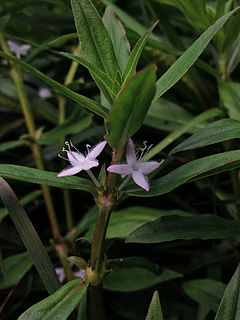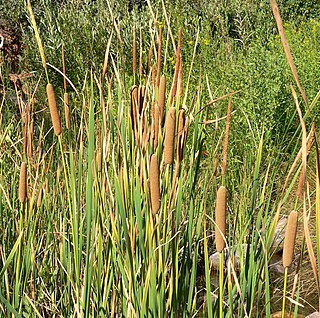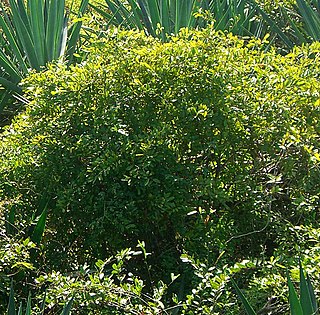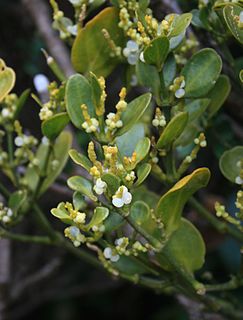
Myrica is a genus of about 35–50 species of small trees and shrubs in the family Myricaceae, order Fagales. The genus has a wide distribution, including Africa, Asia, Europe, North America and South America, and missing only from Australia. Some botanists split the genus into two genera on the basis of the catkin and fruit structure, restricting Myrica to a few species, and treating the others in Morella.

Diodia is a genus of flowering plants in the family Rubiaceae. It was described by Carl Linnaeus in 1753. The genus is found from southern and eastern United States, South America, Central America, Mexico, the West Indies and tropical Africa.
Bonania is a plant genus of the family Euphorbiaceae first described as a genus in 1850. It is native to the West Indies.
- Bonania cubanaA.Rich. - Bahamas, Cuba
- Bonania domingensis(Urb.) Urb. - Haiti, Dominican Rep
- Bonania ellipticaUrb. - Cuba
- Bonania emarginataC.Wright ex Griseb. - Cuba
- Bonania erythrosperma(Griseb.) Benth. & Hook.f. ex B.D.Jacks. - Cuba
- Bonania linearifoliaUrb. & Ekman - Haiti
- †Bonania myricifolia(Griseb.) Benth. & Hook.f. - Guantánamo but extinct

Casasia is a genus of flowering plants in the family Rubiaceae. These shrubs or small trees occur on the Caribbean islands and in one case in Florida. Some of the ten accepted species were formerly placed elsewhere, e.g. in the related genip-tree genus (Genipa), in Gardenia or in Randia.
Gundlachia, commonly called Goldenshrub, is a genus of flowering plants in the daisy family.

Proustia is a genus of flowering plants in the gerbera tribe daisy family, native to South America and the West Indies.

Typha domingensis, known commonly as southern cattail or cumbungi, is a perennial herbaceous plant of the genus Typha.

Portlandia is a genus of flowering plants in the coffee family, Rubiaceae. Members of the genus are endemic to Jamaica.
Thouinia is a genus of flowering plants in the family Sapindaceae. As of 2020 Kew's Plants of the World Online lists 27 species in the genus:

Casasia clusiifolia, also called the sevenyear apple, is a species of plant belonging to the family Rubiaceae. It is common in Florida.
Casasia acunae, is a species of flowering plant belonging to the family Rubiaceae.
Casasia calophylla, is a species of plant belonging to the family Rubiaceae, it is native to Cuba.
Casasia ekmanii is a plant belonging to the family Rubiaceae, it is native to Haiti.
Casasia haitensis is a species of plant that is native to Haiti. It belongs to the family Rubiaceae.
Casasia jacquinioides is a species of plant belonging to the family Rubiaceae.
Casasia samuelssonii is a plant belonging to the family Rubiaceae. It is found in the Dominican Republic.

Morisonia is a genus of flowering plants in the family Capparaceae, found across the Americas from the United States to Argentina. It was recently enlarged with New World Capparis species due to existing taxonomic instability. They tend to be shrubs or small trees.

Dendrophthora, the tree destroyers, is a genus of flowering plants in the sandalwood family Santalaceae, native to tropical and subtropical Latin America and the Caribbean. They are hemiparasitic mistletoes that grow on a wide variety of host plants.
Fuertesia is a genus of flowering plants in the family Loasaceae. It has only one currently accepted species, Fuertesia domingensis, native to Hispaniola. It is a woody climbing liana.








